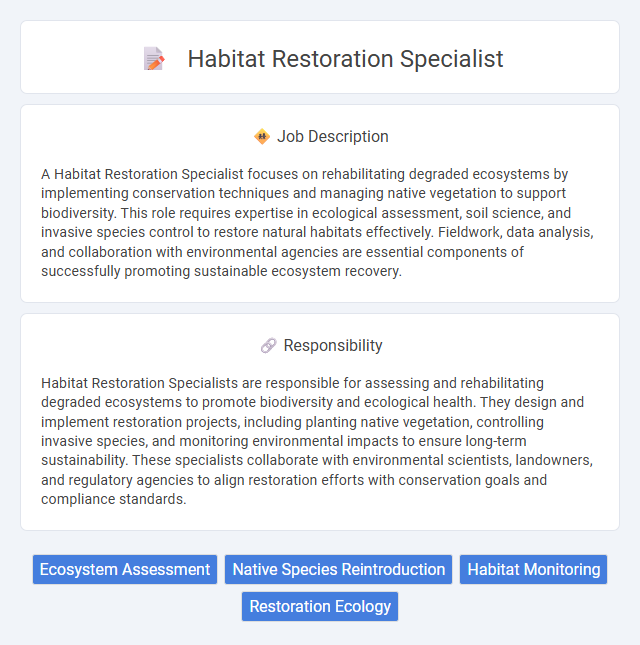
A Habitat Restoration Specialist focuses on rehabilitating degraded ecosystems by implementing conservation techniques and managing native vegetation to support biodiversity. This role requires expertise in ecological assessment, soil science, and invasive species control to restore natural habitats effectively. Fieldwork, data analysis, and collaboration with environmental agencies are essential components of successfully promoting sustainable ecosystem recovery.
People with a strong passion for environmental conservation and physical stamina are likely suitable for a Habitat Restoration Specialist role. Those comfortable working outdoors in various weather conditions and handling hands-on tasks may find this job fulfilling. Individuals who prefer routine office work or have limited physical endurance might find this role less compatible with their strengths.
Qualification
Habitat Restoration Specialists typically require a bachelor's degree in environmental science, ecology, natural resource management, or a related field, with many employers preferring candidates holding advanced degrees. Strong knowledge of native plant species, wildlife habitats, soil science, and ecosystem dynamics is essential for designing and implementing effective restoration projects. Proficiency in GIS technology, data analysis, and field survey techniques, combined with hands-on experience in habitat restoration or conservation, enhances job performance and career prospects.
Responsibility
Habitat Restoration Specialists are responsible for assessing and rehabilitating degraded ecosystems to promote biodiversity and ecological health. They design and implement restoration projects, including planting native vegetation, controlling invasive species, and monitoring environmental impacts to ensure long-term sustainability. These specialists collaborate with environmental scientists, landowners, and regulatory agencies to align restoration efforts with conservation goals and compliance standards.
Benefit
Habitat Restoration Specialists likely contribute to environmental sustainability by improving ecosystems and promoting biodiversity, which may support long-term ecological balance. Their work probably enhances natural habitats, potentially increasing resilience to climate change and benefiting wildlife populations. Additionally, their efforts could provide social and economic advantages through improved natural resources and recreational opportunities.
Challenge
Habitat Restoration Specialist roles likely involve complex challenges such as addressing degraded ecosystems and mitigating the impacts of invasive species. They probably require innovative solutions to balance ecological restoration with human activity and climate change effects. Navigating regulatory compliance and securing funding may also present ongoing difficulties in this field.
Career Advancement
Habitat Restoration Specialists develop expertise in ecosystem management, gaining skills in native plant propagation and invasive species control that enhance career growth opportunities. Progression often leads to roles such as Environmental Project Manager or Conservation Coordinator, where project planning and team leadership are key responsibilities. Advanced knowledge in ecological restoration techniques and regulatory compliance significantly boosts prospects for leadership positions within environmental agencies.
Key Terms
Ecosystem Assessment
Habitat Restoration Specialists conduct detailed ecosystem assessments to identify degradation levels, biodiversity status, and habitat connectivity, crucial for developing effective restoration plans. They utilize GIS mapping, remote sensing technologies, and field surveys to collect data on soil quality, vegetation types, and hydrology, ensuring accurate habitat characterization. Their analyses guide the implementation of restoration techniques aimed at enhancing ecosystem resilience, promoting native species recovery, and mitigating environmental impacts.
Native Species Reintroduction
A Habitat Restoration Specialist specializing in Native Species Reintroduction develops and implements science-based strategies to reestablish indigenous flora and fauna within degraded ecosystems. Expertise in ecological assessments, species propagation, and monitoring ensures the successful revival of biodiversity and habitat resilience. Collaboration with conservation organizations and use of GIS technology optimize site selection and restoration outcomes.
Habitat Monitoring
Habitat Restoration Specialists conduct detailed habitat monitoring to assess ecosystem health, tracking biodiversity indicators and species population trends. They utilize GIS technology and remote sensing tools to analyze habitat changes, ensuring accurate data collection and reporting. Their expertise supports adaptive management strategies aimed at restoring native vegetation and improving wildlife habitats effectively.
Restoration Ecology
A Habitat Restoration Specialist focuses on the application of restoration ecology principles to rehabilitate degraded ecosystems and enhance biodiversity. They conduct site assessments, develop restoration plans, and implement techniques such as native species planting, invasive species removal, and soil stabilization. Mastery in ecological monitoring and adaptive management ensures the long-term success of habitat restoration projects.
 kuljobs.com
kuljobs.com